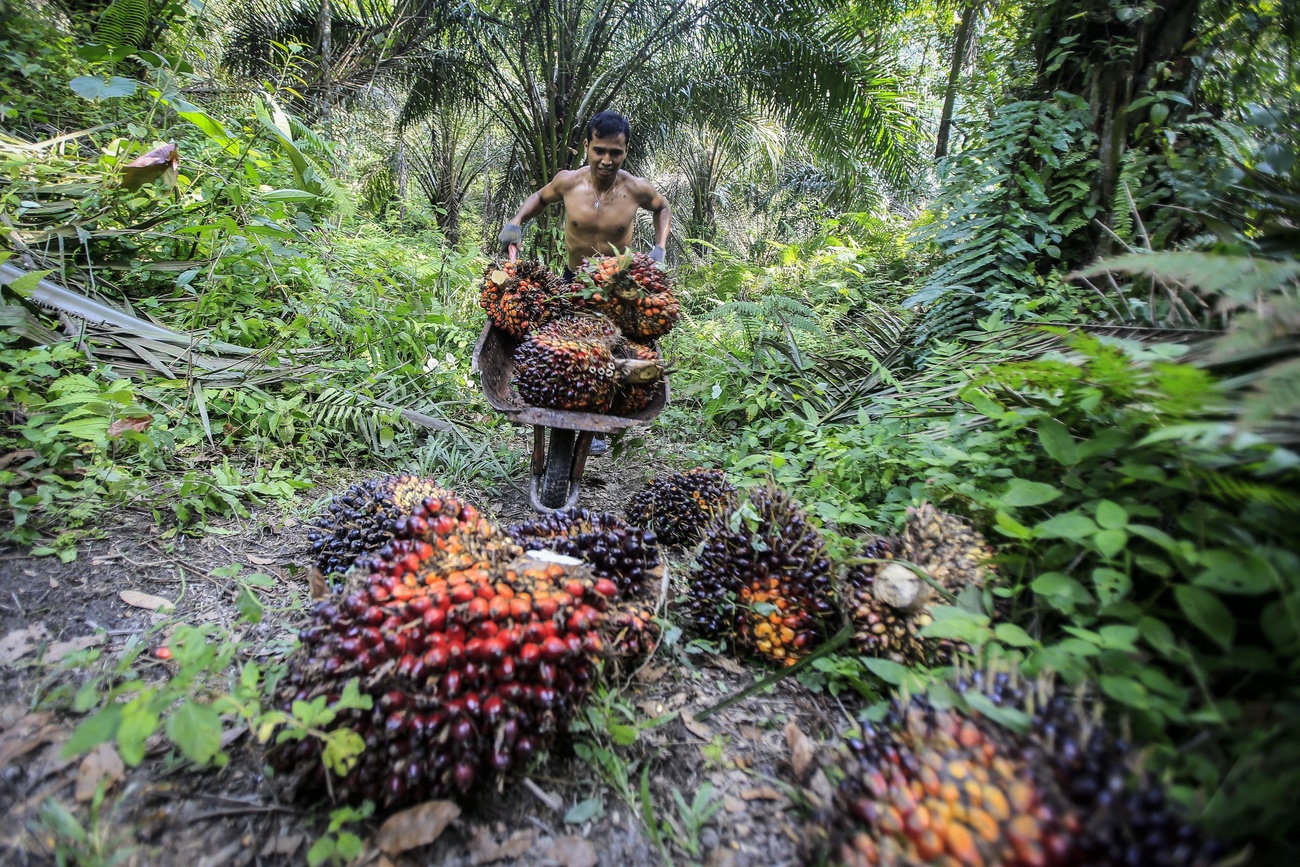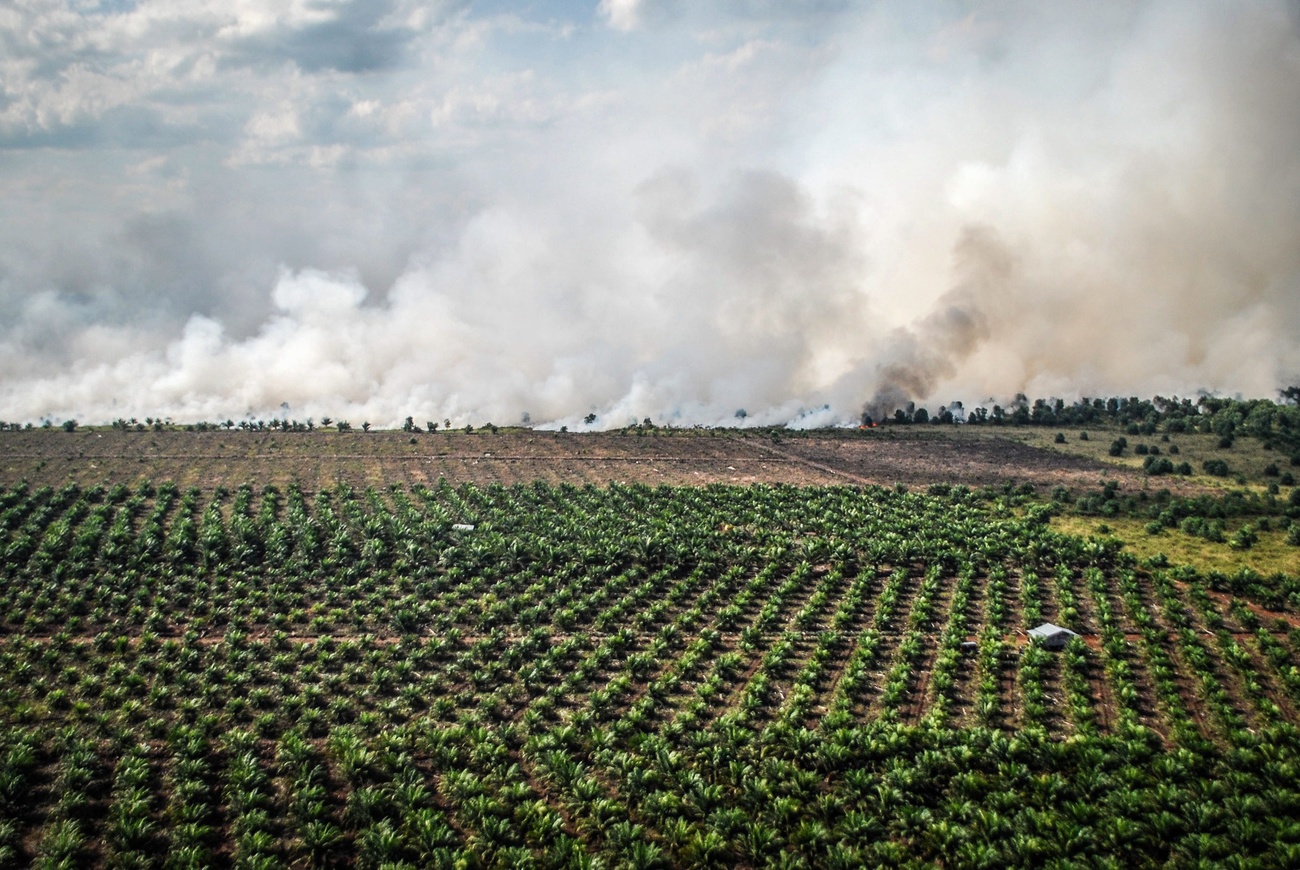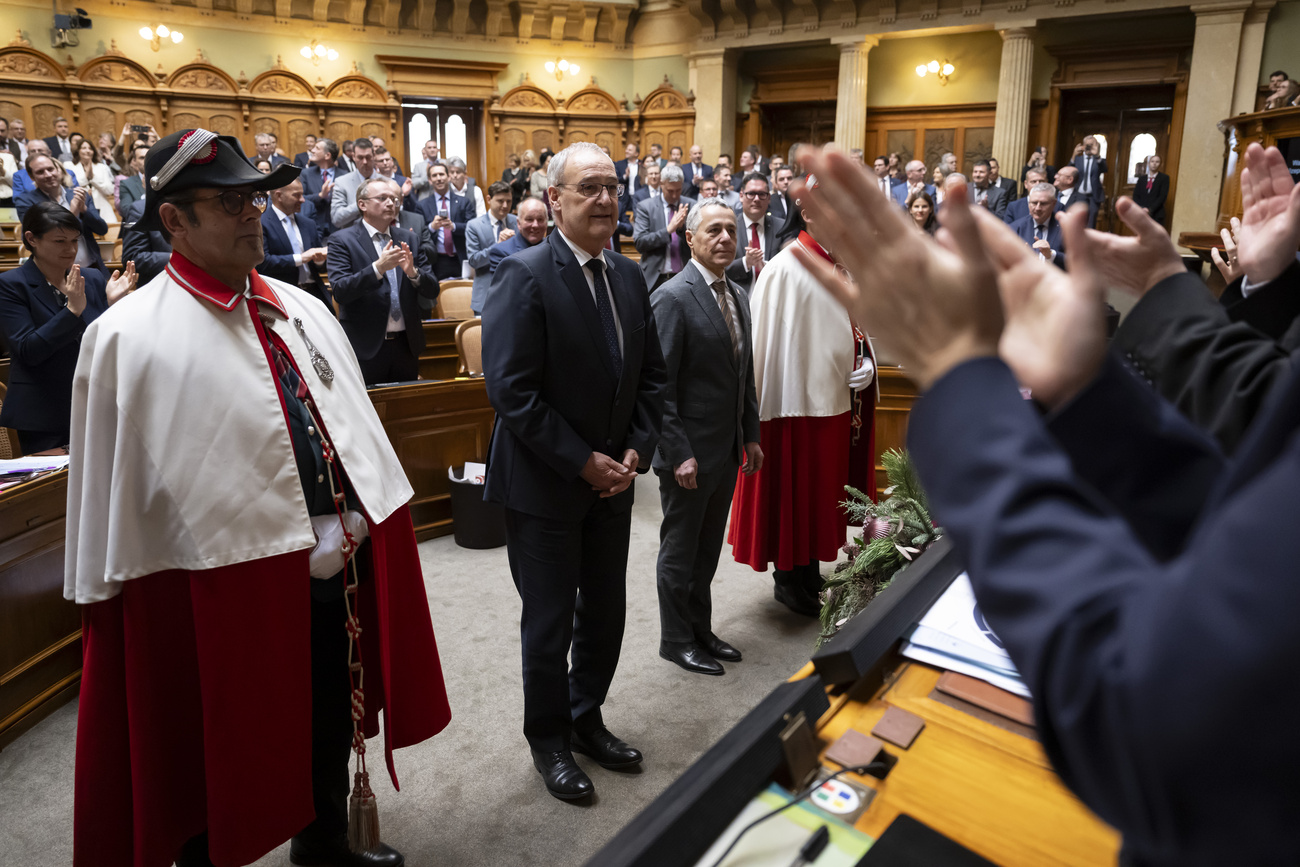
Swiss free trade deal with Indonesia narrowly survives referendum

Voters in Switzerland have given the green light to a free trade deal with Indonesia with a small majority of 51.6%.
The vote was closer than expected after Zurich (the canton with the most voters) showed its hand last, sealing the fate of the referendum. The main pockets of resistance were the French-speaking cantons such as Geneva (where a lot of commodity firms are based) and Vaud (home of the headquarters of Swiss food giant Nestlé).
Palm oil was at the heart of the referendum on the free trade agreement between Switzerland and Indonesia. The deal aims to facilitate trade with the South-East Asian country and will now remove customs duties on Swiss exports like cheese, pharmaceutical products, and watches.
Indonesia, for its part, will be able to sell its industrial products on the Swiss market duty-free. Tariff reductions are also planned for certain agricultural products, in particular palm oil, of which Indonesia is the world’s largest producer and exporter.
Those backing the referendum included opponents of globalisation, left-wing parties and some non-governmental organisations (NGOs). Their arguments against the free trade deal were mainly environmental, with opponents pointing out that palm oil cultivation is linked to the destruction of the rainforest. Supporters of the deal, on the other hand, argued that imported palm oil will have to meet certain environmental standards in order to qualify for a tariff reduction.

More
Indonesia’s palm oil angers Swiss anti-globalisation activists
Vote result reactions
Swiss President Guy Parmelin, who also holds the economy portfolio, said that the Swiss people felt the trade deal was correct and balanced. He added that the concerns of the opponents will be taken into account and Switzerland will support Indonesia in producing sustainable palm oil. “This vote is not a choice of the economy over human rights and the environment,” he said. Parmelin hinted that future trade deals may also incorporate sustainability clauses, but stressed that each agreement is unique with its own set of challenges.
Along with the Swiss government, the palm oil sector in Indonesia – which has suffered economic policy setbacks in Europe – also heaved a sigh of relief.
“We are grateful for the outcome of today’s vote. The trade deal is a win-win for the palm oil industry, for Indonesia, for Switzerland, and for all EFTA nations, and will bring positive benefits for Swiss consumers and exporters, and Indonesian small farmers. The Swiss vote affirmed that Indonesian palm oil is sustainable,” said a spokesperson for the Indonesian Palm Oil Association (GAPKI). The industry body hopes that the result will help convince other European countries that palm oil from Indonesia is “best-in-class” when it comes to sustainability. Indonesia is fighting a European Union ban on the use of palm oil as biofuel by 2021.
The slim margin of victory was a surprise to some. Monika Rühl, director of the Swiss business federation Economiesuisse, was hoping for an emphatic victory for the free trade deal. “We expected a clear-cut yes,” she told Swiss public broadcaster RTS on Sunday. “The concerns of the population must be taken very seriously,” she added, with reference to the protection of human rights and the environment.
Her thoughts were echoed by parliamentarian Simone de Montmollin of the Radical-Liberal Party, who had campaigned for the free trade deal. “This is a signal that an economic agreement cannot be made to the detriment of all the fundamental principles of respect for the environment and social rights,” she said.
Fellow parliamentarian Fabio Regazzi of the Centre, who was also part of the committee for the free trade deal, agreed that forests and labour rights were important. However, he said that the Swiss must bear in mind that eventually it is an economic agreement between two countries. It is not possible “to impose everything you want”, he said of the opponents. Regazzi also regretted that the campaign had focused on the issue of palm oil, which represents only a very small part of the agreement. The many benefits that the agreement brings to small and medium-sized enterprises were absent from the debate, according to him.
Point made
Supporters of the referendum against the trade agreement had mixed emotions.
“I am not at all disappointed” by the result, said the maverick initiator of the referendum Willy Cretegny, an organic winegrower. “We had already won before the results because we opened the debate,” he said.
Both Cretegny and the Green Party (via parliamentary representative Léonore Porchet) expressed their determination to target other free trade deals in the pipeline, most notably the one with Mercosur countries (Brazil, Argentina, Uruguay and Paraguay).
The president of the Young Socialists Ronja Jansen expressed her disappointment at the result. “It was clear from the start that it would be a David versus Goliath fight,” she told Swiss public broadcaster SRF.
Swiss NGOs, especially those that did not take a side in the vote, said the outcome demonstrated that a change in the nature of economic agreements was necessary. Alliance Sud, the Society for Threatened Peoples and Public Eye welcomed the interest shown in the debate on Swiss trade policy.
Where it all began
The seeds of the referendum were arguably sown a decade ago when in 2010 the environmental lobby group Greenpeace took on Swiss food giant Nestlé in a no-holds barred campaign. Greenpeace accused Nestlé of abetting deforestation in tropical countries by using unsustainable palm oil in its products. To drive the message home, Greenpeace created a gory YouTube videoExternal link in the style of a Kit Kat advertisement that equated eating the chocolate bar with killing orangutans.
Nestlé’s attempts to take the video down from YouTube and police its Facebook page only made matters worse. The multinational was finally forced to admit defeat and it pledged to eliminate deforestation in its supply chain by 2020.
Palm oil – which had subtly become a ubiquitous part of Swiss consumption through margarine, baked goods, chocolate, soap and lipstick – was now in the spotlight. Questions about its sustainability were firmly etched into the public consciousness and the commodity was cast in the role of the villain.
Soft target
It wasn’t just food companies like Nestlé that faced flak for their use of palm oil. Banks like Credit Suisse were also criticised for investing and lending to palm oil producers. Research by Indonesian NGO Walhi has shown that legal violations occurred at various plantations funded by Swiss banks. The NGOs Bread for All and the Swiss Catholic Lenten Fund claimed that between 2009 and 2016 Credit Suisse alone had provided financial services worth $901 million (CHF910 million) to the palm oil industry.
Swiss farmers capitalised on the poor reputation of palm oil to lobby for the protection of domestic rape seed oil producers. However, the Swiss Farmer’s Association, which led these lobbying efforts, was embarrassed when Swiss public television revealed that farmers in the country were using palm oil feed supplements to feed their dairy cows.

More
‘We need a global vision of sustainability’
Free trade deal
Although Swiss consumers, farmers and NGOs were gradually turning against palm oil, the government was keen to do more business with Indonesia – the world’s biggest producer of palm oil. Negotiations between the EFTA block (Switzerland, Iceland, Liechtenstein and Norway) and Indonesia began in 2007, and ten years later murmurs of an imminent free trade deal began doing the rounds.
Parliamentarians in six of Switzerland’s 26 cantons (Geneva, Thurgau, Bern, Fribourg, Vaud and Jura) then voted in favour of cantonal initiatives to exclude palm oil from the deal. However, the national parliament rejected these initiatives while agreeing to incorporate sustainability criteria and protect rape seed farmers from adverse consequences of any subsidised palm oil imports.
It appeared that the Alpine nation’s consensus-seeking approach paid off. Switzerland (along with fellow EFTA members) and Indonesia signed a Comprehensive Economic Partnership Agreement in Jakarta on December 16, 2018. A year later the deal was approved by the Swiss parliament.

More
‘This agreement lays the foundation for a more sustainable and fairer economy’
Referendum time
The free trade agreement appeared to be signed and sealed until delivery was rudely interrupted by a rag-tag group led by organic winegrower Willy Cretegny and farmers’ union Uniterre. The so-called “Stop Palm Oil” committee launched a referendum against the free trade deal, and quickly gained the support of around 50 organisations before collecting over 50,000 signatures to trigger a referendum.
As expected, the government came out strongly against the referendum hailing the free trade deal as a pioneer in that it had sustainability criteria already built into it. What was unexpected were divisions among left-wing parties and within the Swiss NGO sector. For example, the majority of Social Democrat politicians were behind the free trade deal when it was put to parliament for approval, as were the party leaders. But the party later had to change its position, after pressure from the rank and file delegates a few weeks ahead of the vote.
Many NGOs were also reluctant to condemn the trade deal outright. They liked the idea of the sustainability clauses incorporated in the agreement but were not completely convinced that verification measures and sanctions were effective. Greenpeace Switzerland, who deserves a lot of the credit for raising awareness on the effects of palm oil in the first place, is one such example. The NGO recommended a “no” vote for the deal, while admitting that “in principle, this is a step in the right direction”.
The result on March 7 could determine the fate of other free trade deals in the pipeline with environmentally sensitive partners like Malaysia or the South American Mercosur (Brazil, Argentina, Uruguay and Paraguay) block.
Ban on facial covering/Burka: 51.2% yes 48.8% no
Digital identification/eID: 35.6% yes 64.4% no
Free trade accord with Indonesia: 51.6.% yes 48.4% no
Turnout: 51.4%
About 5.5 million Swiss citizens, including registered expat Swiss, were eligible to take part in the votes.
There were also numerous ballots at cantonal and local levels on March 7.

More
Vote results: March 7, 2021

In compliance with the JTI standards
More: SWI swissinfo.ch certified by the Journalism Trust Initiative
































Join the conversation!